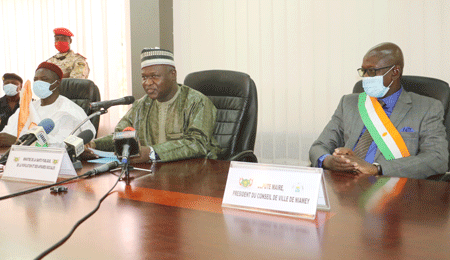The Minister of Public Health, Population and Social Affairs Dr Illiassou Idi Mainassara met yesterday morning at Niamey town hall with health workers from the various health structures in the Niamey region. The purpose of this meeting is to exchange views with these health workers on the issue of healthcare provision in public health structures. This, in order to find palliative solutions to all the shortcomings identified during the various inspections of the health services. This meeting took place in the presence of the governor of the said region and the Central Mayor of the City of Niamey.
In his intervention at this meeting, the Minister of Public Health underlined a number of problems which undermine public health structures. It has in particular an inadequate quality of care, an insufficiency in the management of human resources, the excessive expenditure imposed on patients, the insufficiency in the organization of emergencies, the non-functionality of the referral / counter-referral system, the non-respect for hierarchy, ethics and professional conduct.
Detailing point by point the various shortcomings identified, Dr Idi Illiassou Mainassara stressed that the reception remains to be desired. This has an influence on the quality of care. He also mentioned the delays observed by many agents on the premises of the services and often without valid reason. In addition, there is a frequent breakdown of medicines and consumables, difficulty in accessing specialist doctors whose waiting period is too long, inadequate maintenance and work organization as well as the hygiene of the premises. .
Concerning the insufficiency in the management of human resources, the Minister deplored the absenteeism of the staff, an extension of leaves and authorizations of absence without valid reasons. According to recent investigations, it turned out, according to the minister, that some doctors were absent for 6 to 7 months from their service posts and that in complicity with the regional director of public health (DRSP). Which, he said, is not normal and does not honor the profession. In addition to these problems, there is also the non-respect of the on-call schedule, the use of auxiliaries, volunteers and trainees in place of the incumbents during on-call and duty hours, the absence of on-call for a certain period. category of personnel. For example, the Minister of Public Health confided that during the month of Ramadan following an arrest, a mission of the ministry went to a health district where it was the volunteers and trainees who took charge of the patients while the doctor is at home.
This state of affairs, he said, explains the congestion of hospitals because there is a dysfunction of peripheral structures, despite the concentration of agents in certain districts to the detriment of others. Dr Illiassou Idi Mainassara also deplored the illegal exercise in the private health sector and the lack of sanctions and motivation of human resources.
Finally, with regard to excessive expenses for patients, the Minister of Public Health denounced the importance of non-tariff expenses such as the purchase of drugs outside the hospital, bribes, inadequate treatment ( each practitioner prescribes his prescription, dysfunction of the technical platform), the diversion of patients to private health structures, excessive length of stay, etc. For Minister Idi Illiassou Maïnassara, all these ills must be eradicated from the health system in order to relieve the populations. He stressed that this is not an impossible task because, with good will and a little sacrifice, we can alleviate all these evils.
Prior to the intervention of the Minister of Public Health, the Governor of the Niamey region Mr. Oudou Ambouka indicated that despite the fact that the health coverage rate is 98% in the region, challenges remain. raise. The main one is the population’s access to quality services and care, which remains a major concern. The governor said he was convinced that this mission on the functioning of health services led by the Minister of Health will help improve quality services and care in health structures. Mr. Ambouka reaffirmed his personal commitment and that of all local and customary administrative authorities in the Niamey region to support health facilities in their mission.
For his part, the central mayor of the city of Niamey indicated that the responsibility falls both to the populations and to health workers in order to improve care services in health structures.
After the interventions of the authorities, certain health professionals representing the structures, NGOs active in the health field intervened to make suggestions going in the direction of improving health care services in the capital.
Rahila Tagou (onep)
–

